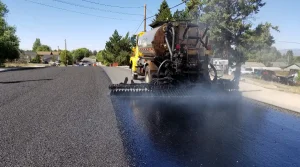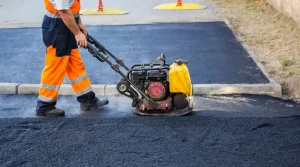Struggling to decide between asphalt and concrete for your paving project? This guide explores the key differences, helping you make an informed choice based on climate, usage, and maintenance needs.
Key Takeaways
- Climate Matters: Asphalt is better for cold climates, while concrete excels in hot weather.
- Durability and Lifespan: Concrete lasts longer (30-40 years) but costs more upfront; asphalt lasts 20-30 years with lower initial costs.
- Maintenance: Asphalt requires regular sealing, while concrete requires less frequent upkeep.
- Installation and Use: Asphalt can be driven on within days, while concrete requires a week to cure.
- Appearance and Cleanliness: Asphalt hides stains well, while concrete shows spills and needs more frequent cleaning.
Paving Choice Considerations
When choosing between asphalt and concrete for your driveway, sidewalk, or parking lot, several factors come into play:
- Usage: Is the area private or open to public access? How many people will use it daily?
- Timing: Can you restrict access during curing or maintenance?
- Load: Will the pavement bear heavy loads?
- Weather: Does your region experience extreme heat or freezing winters?
- Budget: Are you more concerned about upfront costs or long-term value?
Climate: Asphalt vs. Concrete
Cold Climates:
- Asphalt is better suited for freezing temperatures. Its dark surface absorbs heat, helping snow and ice melt faster.
- Unlike concrete, asphalt doesn’t heave or crack as easily due to frost.
- Road salt, commonly used to melt snow, damages concrete but doesn’t affect asphalt significantly.
Hot Climates:
- Concrete is ideal for areas with intense heat. It resists softening or becoming oily in high temperatures.
- Asphalt tends to soften and deform under extreme heat, leading to cracks and sagging over time.
Installation and Repairs
Asphalt:
- Installation: Quicker and more affordable to install than concrete.
- Repairs: Requires regular maintenance but is relatively easy and inexpensive to fix. DIY guides for asphalt repair are widely available.
Concrete:
- Installation: Costs more upfront and takes longer to install.
- Repairs: Though less frequent, repairs can be more complicated and costly compared to asphalt.
Durability and Longevity
- Concrete Driveways: Last 30-40 years if properly maintained.
- Asphalt Driveways: Last 20-30 years with regular upkeep.
While asphalt’s lifespan is shorter, it’s more affordable to replace. Regardless of material, neglecting maintenance will reduce the lifespan of either option.
Curing Time and Accessibility
- Asphalt: Drivable within 2-3 days after installation.
- Concrete: Requires a curing period of about 7 days before it’s safe to drive on.
For areas with limited parking, asphalt may be the more practical choice due to its quicker usability.
Maintenance Requirements
- Asphalt: Needs to be sealed every 3-5 years to prevent cracks and wear. Sealing is a straightforward process and can often be done without professional help.
- Concrete: Doesn’t require sealing as frequently, but applying a sealant can slow fading and enhance its appearance.
Appearance and Cleanliness
- Asphalt: The dark surface hides stains like oil spills, rust, and gas drips well, maintaining a cleaner look.
- Concrete: Stains are more visible, requiring frequent cleaning to preserve its aesthetic appeal.
FAQs
1. Which material is more cost-effective?
- Asphalt has a lower initial cost but requires regular maintenance. Concrete costs more upfront but lasts longer with less frequent repairs.
2. Can I install asphalt or concrete myself?
- While small repairs are manageable, it’s best to hire professionals for installation to ensure proper preparation and longevity.
3. How often should I reseal asphalt?
- Asphalt should be resealed every 3-5 years to protect it from cracks and water damage.
4. Does climate affect longevity?
- Yes. Asphalt performs better in cold climates, while concrete is more durable in hot weather.
5. Which material is more eco-friendly?
- Asphalt is recyclable and often reused in new paving projects. Concrete can also be recycled but is less commonly repurposed.
6. Which material is better for heavy loads?
- Concrete is better for handling heavy loads, making it ideal for industrial and commercial applications.
7. Can concrete or asphalt be customized?
- Concrete offers more customization options, including stamping, coloring, and texturing. Asphalt’s appearance is more uniform but can be resurfaced for a fresh look.
8. How do I prevent cracks in either material?
- Regular maintenance, sealing, and avoiding heavy loads beyond the pavement’s capacity will help prevent cracks.
9. Which material requires less cleaning?
- Asphalt hides stains better and requires less frequent cleaning, while concrete needs regular maintenance to stay visually appealing.
10. What’s cheaper: asphalt or concrete driveway paving?
- Asphalt is the cheaper option upfront, while concrete costs more initially but lasts longer with less maintenance.
Comparison table
| Factor | Asphalt | Concrete |
|---|---|---|
| Initial Cost | Lower | Higher |
| Lifespan | 20-30 years | 30-40 years |
| Maintenance | Needs sealing every 3-5 years | Less frequent maintenance |
| Repair Costs | Lower, easier to repair | Higher, more complex repairs |
| Installation Cost | More affordable, quicker installation | More expensive, longer curing time |
| Curing Time | 2-3 days before use | About 7 days before use |
| Durability in Cold Climates | More resistant to frost and salt | Prone to cracking and salt damage |
| Durability in Hot Climates | Softens and deforms in extreme heat | Resists heat better |
| Stain Resistance | Hides stains well | Shows stains, needs more cleaning |
| Eco-Friendliness | Recyclable, commonly reused | Can be recycled, but less common |
Conclusion
Choosing between asphalt and concrete depends on your climate, budget, and maintenance preferences. Asphalt is cost-effective and ideal for cold climates, while concrete offers durability and better performance in hot regions. For tailored advice and quality paving solutions, contact Hackensack Paving Company at (201) 514-6060 for your free quote!







